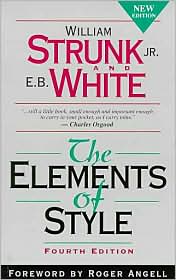In addition to my American Heritage Dictionary, one of my most trusty and useful books, one that is always within reach when I am sitting at my desk, is Strunk and White’s The Elements of Style. Its tiny size belies its value. It is the only reference book I can think of in which the fastest way to find something is simply to flip through the pages rather than to use guidewords, the index, or the table of contents.
Anyway, if you examine the end of the previous sentence, you will see an example of the so-called serial comma, which is described in rule #2 in the Elementary Rules of Usage, found on page 2 of The Elements of Style. The rule states:
In a series of three or more terms with a single conjunction, use a comma after each term except the last.
The title of this post is a good example of this usage. Without the serial comma, the title would have been “Ayn Rand, Strunk and White and the Oxford Comma.” One can see the ambiguity that results from the missing comma. Are “Strunk and White” a pair? Or is Strunk one of the elements in the list and “White and the Oxford Comma” another? The serial comma makes the meaning clear and I have long been in the habit of using it (though the British tend not to use it).
Anyway, it is not my intent in this post to elaborate on the merits of the serial comma, though I think there are some. What I really wanted to relate was a surprising thing that I found when I did an Internet search for “Oxford comma.” I had seen a reference to an Oxford comma somewhere and wondered if it was the same thing as the serial comma in Strunk and White’s rule #2. It turns out that it is.
The surprising thing I found, however, was that for some reason, Ayn Rand figures in what is evidently the classic example of usage used to illustrate the Oxford comma. To pick just one instance, quoting from World Wide Words:
[Q] … Can you tell me what the Oxford comma is?... I wonder if it may refer to the practice of putting a comma after the penultimate item in a list, before the and – for example “eggs, bacon, and sausage” rather than “eggs, bacon and sausage”, which is how I would write it.
[A] You have it exactly right. That form of punctuation is uncommon in British English,… but it’s a characteristic part of the house style of the Oxford University Press, hence the name…
Perhaps the best argument for the serial comma is that apocryphal book dedication: “To my parents, Ayn Rand and God.” [emphasis mine]
I don’t know why Ayn Rand was chosen for the example, but the use seems to be widespread. (Come to think of it, though, if I ever write a book myself, I could hardly leave Miss Rand off the dedication list!) Of course, the whole point of the illustration is to show that without the serial comma, “parents” and “Ayn Rand and God” satisfy the form of apposition, suggesting that Ayn Rand and God are the parents of the author!
I find it fascinating that this example would propagate – and it apparently has. A Google search of “Ayn Rand” and “Oxford comma” yields thousands of references to the phrase.
That illustration of the missing comma is amusing, but there’s an even funnier one in the Wikipedia entry for Oxford_comma. Apparently, The Times (UK) once included in a description of a Peter Ustinov documentary the sentence, “highlights of his global tour include encounters with Nelson Mandela, an 800-year-old demigod and a dildo collector.”








3 comments:
>"I don’t know why Ayn Rand was chosen for the example, but . . . ."
Perhaps because Ayn Rand, "that atheist woman," is in perfect opposition to God in the comma-less apposition. Juxtaposing an atheist and God together, as elements of an apposition, stands out.
Thank you for a well-written, informative, and entertaining article.
That's a good point, Burgess. Perhaps that explains it, and it does make the joke kind of funny because of its absurdity.
Today, Ayn Rand's name seems to be replacing that of Madelyn Murray O'Hare, who was notorious among conservatives decades ago for being "that atheist woman" who brought a case to the Supreme Court. The case led to banning Bible readings in governmental schools.
O'Hare had nothing positive to offer. Ayn Rand created a philosophy for living on earth, Objectivism.
Post a Comment